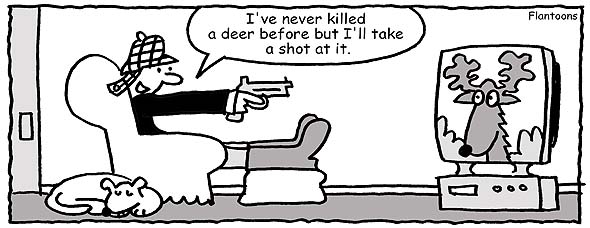
The word like can be confusing for students since it has many different meanings in English. Here are five of its common uses:
Like = enjoy
I like coffee
To be + like = describe personality/characteristics
What is he like?
English has a large number of phrasal verbs, many of which use the preposition out.
For example go out means to leave your home for a short time. Also, remember that some phrasal verbs can have more than one meaning. Go out also means to have a boyfriend/girlfriend.
Look at the context of each sentence and choose the correct definition. Good luck!

This cartoon is based on the idiom take a shot.
Take a shot means 'try to do something; to attempt to do something'.
Examples:
"I don't know the answer to your question, but I'll take a shot anyway."
"I haven't played tennis before but I'm going to take a shot this weekend."
English is a language that is full of many colourful idioms that describe people and situations in a more interesting way than the typical vocabulary. We've looked at idioms many times before and here are 10 more.
For example instead of saying "he's been doing this for a long time", you can say "He's an old hat at this". This is an especially great way of improving your writing.
Here are some more idioms and their meanings:
English has a large number of phrasal verbs, many of which use the preposition 'up'.
Quite a lot of phrasal verbs with up mean 'to increase/improve something'. For example speed up means 'to increase your car's speed'. There are exceptions to this such as hold up which means 'to delay something'.
Look at the context of each sentence and choose the correct definition.
Good luck!
Complete the sentences with these words to make the correct time expressions:
Definitions:
Look for: try to find something
Look forward to: wait with pleasure for something which is going to happen
Look after: be responsible for or take care of someone or something
Complete the sentences with these expressions:
I'm looking forward to...
I'm looking for...
I'm looking after...
Write sentences and questions with the present perfect. Write your sentences in the comments box. Use contractions:
Eg. he/ eat/ breakfast (-)
He hasn't eaten breakfast.
How many of these words do you know?
Do you know both the verb and noun form?
Use the words in the table to complete the ten sentences below.
Today's lesson comes from Nasreen at EC Cape Town English School